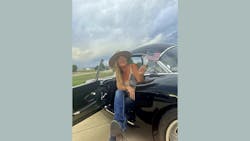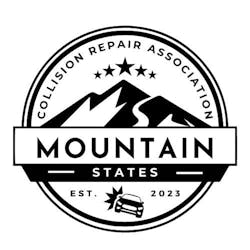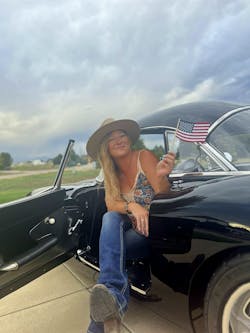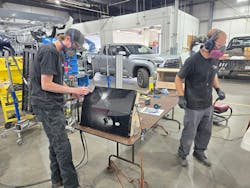A High Climb: President of Mountain States Collision Repair Association Discusses Future of the New Organization
Oct. 30, 2024
5 min read
The Oxford definition of an association is “an official group of people who have joined together for a particular purpose.”
There are many reasons why collision repairers would want to join. The industry is constantly evolving through technology, often lacking the training or educational tools to maintain success through these changes, and facing a shortage of young professionals entering the field.
Collision repair associations across the country help meet these needs.
FenderBender had the chance to speak to Megan Mueller, the founder of the Mountain States Collision Repair Association (MSCRA) as well as the president for their board. She is also the co-owner of Ozzie’s Body Shop in Loveland, Colorado. She shared insights into the formation and vision of the association.
Formation
The MSCRA was officially founded over a year ago. Initially, it was the idea of a few current board members who laid the groundwork. But the association opened its doors to potential members about four months ago.
“We want to offer support to people in the collision industry both in the state of Colorado and the state of Utah right now,” Mueller said. The association aims to foster a community where members can share experiences and learn from each other.
“We’re still in our baby steps, for sure, but we’re super excited to see where it goes,” she added. The goal is to create a robust network of collision repair professionals who can collaborate and support each other.
“It’s been a grassroots effort, and we’re grateful for the support we’ve received so far.”
Expansion Plans
The association is considering expanding to Idaho and Wyoming, Mueller said. “We have some extremely rural shops that are really far away from technology and from dealers,” Mueller explained. The association aims to bridge this gap by offering resources and education to these remote locations.
“With the ability to hold monthly Zoom meetings, we can provide educational content to members regardless of their location,” she said. This approach allows the association to offer valuable resources to shops that may not have access to in-person training and support.
Challenges and Solutions
One of the significant challenges faced by the association is the diverse needs of shops in densely populated cities versus those in rural areas. “We want to provide education that can be used by everybody,” she said. The association aims to connect rural shops with the right resources to help them perform proper and safe repairs.
After being open to membership for only four months, as of August 22, MSCRA has a member count of 31.
“I love the idea of there being a community of people that everybody can reach out to within their state or within the two states,” she said. Granted, it can be hard for repairers separated by the rural/urban divide.
“Performing proper and safe repairs is more of a challenge in rural areas where you don’t have the resources,” Mueller said. The association aims to provide these shops with the tools and knowledge they need to succeed.
During the MSCRA infancy, the organization has had many industry heads featured in their monthly meetings discussing important topics such as:
- Danny Gredinberg with the DEG (Database Enhancement Gateway) and Collision Advice discussing the DEG and Repair Planning
- Sam and Richard Valenzuela with National Autobody Research, Billable Genie, and Labor Rate Hero talking about inflation, market approvals, market rates, and more
- Erin Solis with the Society of Collision Repair Specialists and Square One Coyote Vision Group to discuss post-repair inspections
At press time, Mueller plans to have discussions with Greg Peeters of Car ADAS and Keith Egan with Betag North America.
Running an auto body association can still come with challenges despite having numbers comparable to a single state auto body association. In the distant future, Mueller would like to see each state represented in chapters under the MSCRA.
Previous Associations
Mueller addressed the challenges the previous collision repair associations in Colorado and Utah faced.
“One of the main things I heard from other people was that getting support is crucial,” she said. “It’s a lot of work to run an association, so having the support is a huge thing.”
“They would get together and complain about what was wrong with the industry rather than putting resources in front of people to meet those challenges,” she explained. “We want to be 100% positive and solution-focused.”
The Utah Auto Body Association website is offline, and their Facebook shows that their last post came in 2021. The only existing state association in Colorado was Automotive Service Association (ASA) Colorado, but as Mueller explained, it’s more mechanically oriented.
“We didn’t want to reinvent the wheel,” Mueller said. “We have all these other associations that are incredible, and we can learn from them.”
Personal Journey
Mueller shared her personal journey in the collision repair industry. Growing up in her family’s shop, Ozzie’s Body Shop, she developed a deep passion for the industry. Despite her father’s initial reluctance, Mueller eventually took over the business and has been instrumental in its growth and success.
“I grew up at the shop, running around cleaning in the summers,” she recalled. “I really wanted to be involved in the industry.”
Mueller’s journey is a testament to her dedication and hard work. She left her career as a dental hygienist to join the family business full-time in 2017. Since then, she has been focused on growing the business and adapting to the rapidly changing industry.
“My dad is one of my best friends, and he’s always called me the boy of his three girls,” she said. “He’s been incredibly supportive and has helped me navigate the challenges of the industry.” It’s no wonder why support access is important to Mueller.
“None of us have to feel alone in this industry anymore,” she said. “I want to say a huge thank you to everybody that’s been involved with helping all of us get the Mountain States Collision Repair Association going.”
About the Author
Abdulla Gaafarelkhalifa
Abdulla Gaafarelkhalifa is a former associate editor at FenderBender and ABRN. He has a bachelor’s degree in English from the University of Wisconsin-La Crosse and has covered various beats beyond collision repair news such as politics, education, sports, and religion. His first car was a silver 2009 Chrysler Sebring, which he nicknamed the Enterprise because he’s a Star Trek fan. He now drives a 2014 Jeep Cherokee in order to tolerate Minnesota winters.
Sign up for our eNewsletters
Get the latest news and updates





